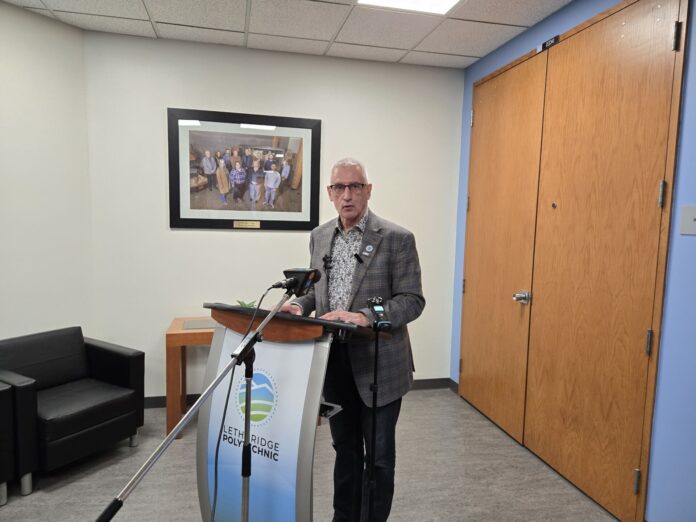Changes to international student policies and support services for newcomers announced by the federal government are being felt locally according to officials at Lethbridge Polytechnic.
Lethbridge Polytechnic has announced that the English Language Centre is closing as of June 30, 2025. The move means about 20 employees will be terminated.
“The centre’s closure is a result of significant [funding] cuts to the Language Instruction for Newcomers to Canada program, or LINK, provided by Immigration, Refugees and Citizenship Canada,” says the polytechnic’s CEO and president, Dr. Brad Donaldson.
“We had sought renewal of a five-year grant that supported us teaching up to level eight language skills [and] we were offered a one-year contract that only supported instruction to level four,” he adds.
Donaldson says the announcement is not an easy one to make but is grateful for the work of centre staff. “I want to thank them for their commitment, engagement and caring in the important work that they do,” he remarks.
Donaldson adds that for over 50 years, the centre has not only offered language instruction but “a sense of community and belonging to more than 100 [current] students and legions more over the decades”.
“The loss of English language training is especially painful as language proficiency is key to success in Canada.”
Donaldson says it helps newcomers integrate into their community and find jobs.
IMPACT FELT NATION-WIDE
Donaldson says a cap on international student visas, announced by Ottawa in 2024, is a move being felt at post-secondary institutions across the country.
“A cap on international students and rules about which programs will be eligible for post-graduate work programs have damaged Canada’s reputation as a destination of choice for international students,” he states.
“According to Colleges and Institutes Canada, the international student cap has led to a 54 per cent drop in enrolment across Canada [and] only 60 per cent of Lethbridge Polytechnics’ programs are considered eligible for post-graduate work permits, even though graduates of these programs are highly sought by sectors experiencing labour shortages. An example is our Civil Engineering Technology program.”
Donaldson notes that across Canada, about $2 billion in tuition revenue is at-risk with fewer international students coming to study in the country. “This doesn’t include the economic benefits they bring as consumers and employees in our community.”
“We acknowledge that the federal government had to make a change to address the few institutions in other provinces that ill-used international student tuition. However, the blanket application of these changes is doing lasting harm to Canada’s reputation, the results of which will not only be felt by post-secondary institutions, but by many other sectors including tourism and service industries,” he adds.
Donaldson says he is not sure how much of a reduction Lethbridge Polytechnic will see as far as international student enrolment goes but believes it will be “a few hundred”.
He adds other programs could be cut or reduced in size, due to the international student cap, but the institution will evaluate the situation and make any future decisions carefully.
LOCAL STUDENTS
President of the Lethbridge Polytechnic Student Association Nagaraj Rotti says there is a lot of worry from international students.
“Students are the heart of this institution, and their success is integral to the success of the community,” Rotti, who is an international student himself, says.
“International students here, they come with a dream of staying and supporting the current economy while hoping for a stable lifestyle here. These changes have put a lot of strain on how they see their future going forward in Canada is going to be.”
Rotti encouraged fellow students to be patient and continue focusing on their studies.
Donaldson assured that all students currently enrolled at the polytechnic, including international learners, will be able to complete their studies. “We will make sure that they are able to complete their program [even] if we have to make any program changes.”
Despite this setback, Donaldson is optimistic about the institution’s future.
“We are not taking these decisions lightly and we will take the time we need to ensure we make the right decisions for our future, our community and our students,” he says.
“I am confident we will emerge from this situation a stronger organization that will continue to serve students and our community.”







